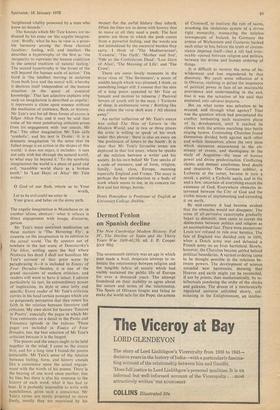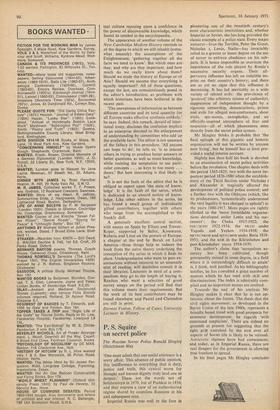Dermot Fenlon on Spanish decline
The New Cambridge Modern History: Vol IV, The Decline of Spain and the Thirty Years War 1609-48159, ed. J. P. Cooper (CUP 80s)
The seventeenth century was an age in which men made a final, desperate attempt to re- instate the relationship between religion and the tangible fabric of society which had visibly sustained the public life of Europe for over a thousand years. The attempt foundered on their inability to agree about the nature and terms of the relationship. The Spain of Olivares fought and failed to make the world safe for the Pope; the armies of Cromwell, to institute the rule of saints, smashing the idolatrous system of a divine right monarchy, massacring the helpless townspeople of Ireland. In Germany the armies of Wallenstein and Gustavus hacked each other to' bits before the truth of circum- stance imposed itself—that a rift had irrev- ocably opened between religion and politics, between the divine and human ordering of things.
It is difficult to recover the sense of be- wilderment and loss engendered by that discovery. We catch some reflection of it in Olivares, realising in defeat the impotence of political power in face of an inscrutable providence and understanding in the end, that it was the salvation of his soul that mattered, solo salvarse importa.
But on what terms was salvation to be secured, and through what agency? That was the question which had precipitated the conflict. tormenting each successive phase Of its development, until it reached its climax with the armies marching into battle
singing hymns. Contending Churches each themselves divided both against each other
and within themselves, about the very issue which statesmen encountered in the ob- stinacy of events, and theologians in the study of Augustine—the issue of human power and divine predestination. Conflicting claims and mutual anathemas bred doubt and insecurity. One German cobbler, a Lutheran at the outset, became in turn a monk, a pietist, a Catholic again, and in the end a Jew, uncertain of everything except the existence of God. Everywhere obstacles in- tervened between the City of God and the visible means of implementing and extending it on earth.
By mid-century it had become evident that the obstacles would not disappear. The sense of all-pervasive catastrophe gradually began to diminish; men came to accept the distinctions between politics and religion as an accomplished fact. There were exceptions: Louis xiv refused to rule over heretics. The fate of England was decided only in 1690, when a Dutch army met and defeated a French army on an Irish battlefield. Slowly, however, the Churches became settled behind political boundaries. A variant ordering came to be thought possible in the relations be- tween powers. The development of science revealed new harmonies, showing that Heaven and earth might yet be reconciled, if not by priests, then mathematically, by in- tellectuals pondering the order of the clocks and galaxies. The dream of a mechanically regulated universe unfolded slowly, cul- minating in the Enlightenment, an intellec- teal culture reposing upon a confidence in the power of discoverable knowledge, which found its symbol in the encyclopaedia.
'The appearance of another volume of the New Cambridge Modern History reminds us of the degree to which we still inhabit (some- what uneasily) the assumptions of the Enlightenment, 'gathering together all the facts we need to know'. But which ones are • they, and why are they important, and how much do we really know about them? Should we study the history of Europe or of Asia? Should we assume that everything is equally important? All of these questions, except the last, are conscientiously posed in the editor's introduction, as problems with which historians have been bothered in the recent past.
'The unevenness of information as between different countries and its total quantity for all Europe make effective synthesis unlikely,' he says. Indeed, this remark, devoid of inten- tional irony, discloses the confusion implicit in an enterprise devoted to the enlargement of understanding by committees who add up the available faots. The editor is not unaware of the fallacy in this procedure. 'All anyone can hope to do', he tells us, 'is to interest others in trying to produce better answers or better questions, as well as more knowledge, while resisting the temptation to use parti- cular concepts . . . as keys to too many . . . doors.' But how interesting is that likely to be?
It is not the fault of the editor that he is obliged to report upon 'the state of know- ledge'. It is the fault of the series, which is dedicated to an absurd notion of know- ledge. Like other editors in the series, he has found a small group of individually gifted contributors, together' with others who range from the accomplished to the frankly dull.
A genuinely excellent central section, with essays on Spain by Elliott and Trevor- Roper, supported by Beller, Kossmann, - Roberts and Livet on the powers of Europe; a chapter at the end by Borah on Latin America—these things help to redeem the book from the naïve theory underlying the conception of the series in which it finds its place. Undergraduates who want to pass ex- aminations without recourse to an unseemly stint of reading, will doubtless consult it in their libraries. Lecturers in need of a com- pendium may go to the length of buying it. Readers who want a selection of good survey essays on the period will find that this volume meets their requirements. But the work of its best contributors may be found elsewhere; and Pascal and Clarendon are still in print.
Dermot Fenton, Fellow of Caius, University Lecturer in History.











































 Previous page
Previous page